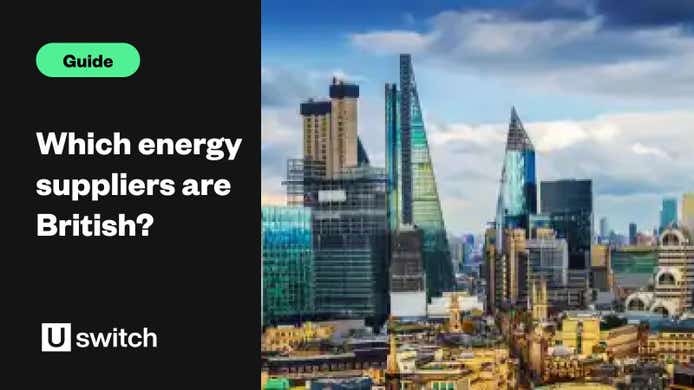Where does the UK's energy come from?
The UK gets its energy from a variety of sources from both inside the country and from abroad. That energy mostly comes into people's homes as gas and electricity, providing heating and power, and it is generated from other power sources such as coal, natural gas, nuclear power and renewables.
UK gas supply
The UK does have its own fuel reserves, although the nature of these reserves has changed over time, and the percentage of our fuel sourced domestically has decreased. As such, the UK also imports gas, predominantly from Norway but also from Russia. Some gas also comes through pipelines under the English Channel from Belgium and the Netherlands, and in a liquid state from Qatar.
UK electricity supply
While historically the majority of our electricity was produced using coal from the UK, nowadays coal is only one component. Today, electricity production is more complicated, as it is produced from gas, coal, nuclear and renewable sources — some of which is domestically produced and some of which is imported.
What makes up my energy supply?
This will depend on your energy supplier. The majority of gas for all suppliers is supplied as outlined above. However, how a supplier sources your electricity is a bit more complicated.
First, let's look at the average fuel mix breakdown for all suppliers (according to gov.uk data from April 2022 to March 2023):
- 3.4% Coal
- 39.3% Natural gas
- 13,9% Nuclear
- 40.8% Renewable
- 2.6% Other
Click on your supplier below to find out how their fuel mix compares to the average:
- What is British Gas's fuel mix?
- What is ScottishPower's fuel mix?
- What is EDF Energy's fuel mix?
- What is E.ON Next's fuel mix?
- What is OVO Energy's fuel mix?
Which fuel sources produce gas and electricity in the UK?
There are a variety of power sources in the UK producing the gas and electricity that comes into our homes. See below for a rundown of each of the main fuel sources.
Nuclear
Nuclear power stations in the UK generate a high amount of electrical energy. Producing energy from a nuclear power plant also uses very little CO2 and is therefore a relatively small contributor to greenhouse gases.
Coal
Coal is one of the largest contributors of CO2 emissions in the world, and that's partly why its influence on the UK's power supply is gradually diminishing. During the 1940s, coal supplied nearly all of the UK's power, in part because it is a fairly cheap fuel source to produce. However, the price of other, less polluting fuel sources has closed the gap, making coal one of the least-used fuel sources.
Renewable energy
Wind power is the most popular renewable energy source in the UK. Virtually none of it was being used as recently as 1990, but it now makes up a large proportion of the UK's major fuel sources. The cost of wind power, which comes from offshore and onshore wind turbines, has significantly reduced with time, so it’s no surprise that it has taken up a bigger part of Britain's renewable energy sources. Hydroelectric power, which uses the energy from a heavy stream of water to generate a turbine, is expected to become a more popular fuel source.
Meanwhile, bio energy, which comes from extracting energy from organic material, is on the rise. There are debates as to whether this source is renewable due the fact that methods such as wood burning (a common bio energy source) actually contributes to CO2 emissions. Bio energy can also be created from sewage, manure and food waste, which are said to be greener sources. The latest UK energy statistics found that renewable energy is now responsible for over 47% of the UK's electricity generation in total.
Natural gas
Natural gas from the North and Irish sea provides a large proportion of UK gas supplies. However, in recent years there has been a shift towards importing natural gas via pipelines in Europe and Norway, as well as shipping Liquified Natural Gas (LNG) from other parts of the world.
How do I choose more renewable energy sources?
You can choose the type of energy you consume by choosing a particular supplier, choosing a particular plan or tariff, or by generating your own. If your energy comes from one of the big six suppliers, check the links above ('What makes up my energy supply?') where you'll find a list of the big six suppliers' fuel mix so you can see which plans are the 'greenest'.
However, switching your energy supply could get you greener and possibly cheaper deals. Most energy suppliers now offer at least one 'green' energy plan to customers, at ever-cheaper rates than before. The exact fuel mix will vary by supplier, but a green plan will usually offer 100% renewable electricity as standard.
Energy suppliers renewable energy plans
Some energy suppliers have gone one step further than offering a specialist green energy tariff, only offering plans that are categorised as renewable energy plans:
These listed energy suppliers have 100% renewable electricity plans that are often cheaper than the big six standard energy deals. To find a renewable energy deal, run an energy comparison and use the "green plans" filter.
Renewable energy plans are growing in popularity as they become more affordable and are offered by more energy suppliers. You can find out how many people in your area have made the switch to green energy here. If you want a greener fuel mix in your home, then you can also consider producing your own energy. The most popular form of domestic fuel generation is solar power.




